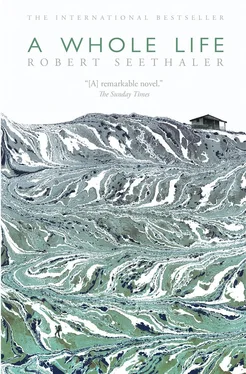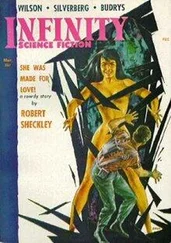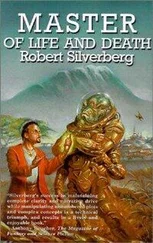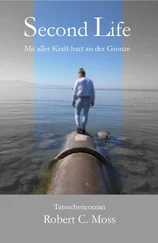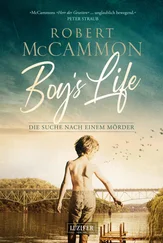Robert Seethaler - A Whole Life
Здесь есть возможность читать онлайн «Robert Seethaler - A Whole Life» весь текст электронной книги совершенно бесплатно (целиком полную версию без сокращений). В некоторых случаях можно слушать аудио, скачать через торрент в формате fb2 и присутствует краткое содержание. Год выпуска: 2015, Издательство: House of Anansi Press Inc, Жанр: Современная проза, на английском языке. Описание произведения, (предисловие) а так же отзывы посетителей доступны на портале библиотеки ЛибКат.
- Название:A Whole Life
- Автор:
- Издательство:House of Anansi Press Inc
- Жанр:
- Год:2015
- ISBN:нет данных
- Рейтинг книги:4 / 5. Голосов: 1
-
Избранное:Добавить в избранное
- Отзывы:
-
Ваша оценка:
- 80
- 1
- 2
- 3
- 4
- 5
A Whole Life: краткое содержание, описание и аннотация
Предлагаем к чтению аннотацию, описание, краткое содержание или предисловие (зависит от того, что написал сам автор книги «A Whole Life»). Если вы не нашли необходимую информацию о книге — напишите в комментариях, мы постараемся отыскать её.
Set in the mid-twentieth century and told with beauty and tenderness, his story is one of man's relationship with an ancient landscape, of the value of solitude, the arrival of the modern world, and above all, of the moments, great and small, that make us who we are.
A Whole Life — читать онлайн бесплатно полную книгу (весь текст) целиком
Ниже представлен текст книги, разбитый по страницам. Система сохранения места последней прочитанной страницы, позволяет с удобством читать онлайн бесплатно книгу «A Whole Life», без необходимости каждый раз заново искать на чём Вы остановились. Поставьте закладку, и сможете в любой момент перейти на страницу, на которой закончили чтение.
Интервал:
Закладка:
The bonesetter Alois Klammerer also eased little Egger’s broken thigh back together. Afterwards he splinted the leg with a couple of thin wooden laths, lubricated it with herbal ointment and wrapped it in a thick bandage. Egger had to spend the next six weeks on a straw mattress in the attic, relieving himself lying down, in an old cream bowl. Many years later, long after he had grown to manhood and was strong enough to carry a dying goatherd down the mountain on his back, Andreas Egger thought back to those nights in the attic and the stench of herbs, rat droppings and his own excreta. He felt the warmth of the room below rising up through the floorboards. He heard the farmer’s children moaning softly in their sleep, Kranzstocker’s rumbling snores, and the inscrutable sounds of his wife. The noises of the animals drifted up to him from the barn, their rustling, breathing, munching and snuffling. Sometimes, on bright nights when he couldn’t fall asleep and the moon appeared in the little skylight, he tried to sit up as straight as possible to be closer to it. The moonlight was friendly and soft, and when he contemplated his toes in it they looked like small round lumps of cheese.
When the bonesetter was finally called back six weeks later to undo the bandage, the leg was as thin as a chicken bone. It also jutted out crookedly from the hip and seemed generally to have turned out a bit twisted and awry. ‘It’ll sort itself out, like everything in life,’ said Klammerer, bathing his hands in a bowl of milk fresh from the cow. Little Egger bit back the pain, climbed out of bed, dragged himself out of the house and a little further, to the big chicken field where the primroses and leopard’s bane were already in bloom. He slipped off his nightshirt and let himself fall backwards onto the grass with outstretched arms. The sun shone on his face, and for the first time he could remember he thought about his mother, whom he had not been able to picture for years. What must she have been like? What must it have been like for her, lying there, towards the end? All small and thin and white? With a single, trembling patch of sun on her brow?
Egger regained his strength. His leg, though, remained crooked, and from then on he went through life with a limp. It was as if his right leg always needed a moment longer than the rest of his body; as if before taking every step it first had to consider whether it really was worth the exertion.
Andreas Egger’s memories of the childhood years that followed were frayed and fragmentary. Once he saw a mountain start to move. A jolt seemed to pass through the side in shadow, and with a deep groan the whole slope began to slide. The mass of earth swept away the forest chapel and a couple of haystacks, and buried beneath it the dilapidated walls of the abandoned Kernsteiner farm, which had been empty for years. A calf, separated from the herd because of an ulcer on its hind leg, was thrown high up into the air along with the cherry tree to which it was tethered: it gawped out over the valley for a moment before the scree surged in and swallowed it whole. Egger remembered people standing in front of their houses open-mouthed, watching the disaster unfold on the other side of the valley. The children held hands, the men were silent, the women wept, and everything was overlaid with the murmur of the old villagers reciting the Lord’s Prayer. A few days later the calf was found a few hundred metres down the mountain, still tethered to the cherry tree, lying in a bend in the stream with a swollen belly, its stiff legs pointing at the sky and the water washing round it.
Egger shared the big bed in the bedroom with the farmer’s children, but this didn’t mean he was one of them. For the whole of his time on the farm he remained an outsider, barely tolerated, the bastard of a sister-in-law who had been punished by God, with only the contents of a leather neck pouch to thank for the farmer’s clemency. To all intents and purposes he was not seen as a child. He was a creature whose function was to work, pray, and bare its bottom for the hazel rod. Only Nana, the farmer’s wife’s aged mother, spared him a warm look or a friendly word now and then. Sometimes she would place her hand on his head and murmur a quiet ‘God bless you’. When Egger heard of her sudden death, during the haymaking — she had lost consciousness while baking bread, toppled forwards and suffocated with her face in the dough — he dropped his scythe, climbed wordlessly all the way up past the Adlerkante and looked for a shady spot to cry in.
Nana was laid out for three days in the little chamber between the farmhouse and the cattle shed. It was pitch dark in the room: the windows had been blacked out and the walls were hung with black cloths. Nana’s hands were folded over a wooden rosary, her face lit by two flickering candles. The smell of decay quickly spread throughout the house; outside the summer was sweltering and the heat penetrated through every chink. When the hearse arrived, drawn by two enormous Haflingers, the farmer’s family gathered around the body one last time to say goodbye. Kranzstocker sprinkled it with holy water, cleared his throat and muttered a few words. ‘Nana’s gone now,’ he said. ‘We can’t know where to, but it’ll be as it’s meant to be. The old die, making way for new. That’s how it is and how it’ll always be, amen!’ The body was hoisted onto the cart and the funeral procession, in which, as was the custom, the whole village participated, slowly began to move. They were just passing the smithy when its soot-covered door suddenly burst open and the smith’s dog shot out into the open. Its fur was jet-black and between its legs its swollen, scarlet sex shone bright as a beacon. Barking hoarsely it hurtled towards the horses drawing the cart. The coachman flicked his whip across the dog’s back, but it seemed to feel no pain. It leapt at one of the horses and sank its teeth into its hind leg. The Haflinger reared up and kicked out. Its enormous hoof hit the dog’s head; there was a cracking noise, the dog yelped and fell like a sack to the ground. In front of the cart the injured horse staggered to one side, threatening to drag the carriage into the meltwater ditch. The coachman, who had leapt off the box and seized his animals’ reins, managed to keep both cart and horses on the road, but at the back the coffin had slid and got stuck sideways. The lid had only been provisionally closed for transportation and was supposed to be nailed down at the graveside: it had sprung open, and the dead woman’s forearm appeared in the gap. In the darkness of the viewing room her hand had been snow-white, but here, in the bright midday light, it appeared as yellow as the flowers of the little Alpine violets that blossomed on the shady banks of the stream and withered the instant they were exposed to the sun. The horse reared up one last time before coming to a standstill, flanks quivering. Egger saw Nana’s dead hand dangling from the coffin, and for a moment it seemed she was trying to wave goodbye to him: a very last ‘God bless you’, meant for him alone. The lid was closed, the coffin pushed back into place, and the funeral procession was able to continue on its way. The dog stayed behind on the road where it lay on its side, shuddering convulsively, paddling in circles and snapping blindly at the air. The clacking of its jaw could be heard for quite some time, before the smith dashed its brains out with a peening anvil.
In 1910 a school was built in the village, and every morning, after tending to the livestock, little Egger sat with the other children, in a classroom that stank of fresh tar, learning reading, writing and arithmetic. He learned slowly and as if against a hidden, inner resistance, but over time a kind of meaning began to crystallize out of the chaos of dots and dashes on the school blackboard until at last he was able to read books without pictures, which awoke in him ideas and also certain anxieties about the worlds beyond the valley.
Читать дальшеИнтервал:
Закладка:
Похожие книги на «A Whole Life»
Представляем Вашему вниманию похожие книги на «A Whole Life» списком для выбора. Мы отобрали схожую по названию и смыслу литературу в надежде предоставить читателям больше вариантов отыскать новые, интересные, ещё непрочитанные произведения.
Обсуждение, отзывы о книге «A Whole Life» и просто собственные мнения читателей. Оставьте ваши комментарии, напишите, что Вы думаете о произведении, его смысле или главных героях. Укажите что конкретно понравилось, а что нет, и почему Вы так считаете.
